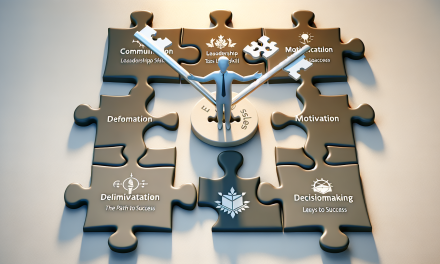Table of Contents
- Introduction
- Why Leadership Matters
- Core Leadership Competencies
- Strategic Thinking: The Backbone of Effective Leadership
- Fostering Collaboration and Team Dynamics
- Enhancing Personal Leadership Skills
- Mastering Project Management
- Conclusion
- Frequently Asked Questions
Introduction
Leadership and management are two of the most vital components for any organization striving for success. However, many professionals often find themselves yearning for a deeper understanding of advanced techniques that can sharpen their leadership acumen. The Advanced Leadership & Management Certificate Program can be an excellent avenue for professionals looking to elevate their skills and drive their organizations to new heights. You can learn more about it here.
Why Leadership Matters
In today’s fast-paced business environment, effective leadership plays an indispensable role. Leaders shape the culture, influence employee engagement, and drive organizational performance. Moreover, they are responsible for fostering an environment conducive to innovation and collaboration.
As companies navigate the complexities of the modern world, strong leadership becomes even more critical. Leaders must adapt quickly to changes, anticipate challenges, and guide their teams effectively. Thus, enhancing leadership competencies becomes essential for professional development and organizational success.
Core Leadership Competencies
To excel in leadership roles, several core competencies must be cultivated:
Emotional Intelligence
Emotional intelligence (EQ) encompasses self-awareness, self-regulation, motivation, empathy, and social skills. High EQ enables leaders to navigate social complexities and make informed decisions that foster team cohesion.
Communication Skills
Effective communication is paramount for leaders. Clarity, transparency, and active listening help build trust and facilitate understanding among team members. Furthermore, mastering various communication styles ensures that messages resonate with diverse audiences.
Decision-Making Abilities
Great leaders are decisive. They analyze pertinent information, weigh the pros and cons, and make informed choices that align with organizational goals. Moreover, involving team members in the decision-making process cultivates a sense of ownership and accountability.
Strategic Thinking: The Backbone of Effective Leadership
Strategic thinking enables leaders to set clear goals and define the path to achieving them. By looking beyond immediate challenges, leaders can visualize the bigger picture and prioritize initiatives that will generate the most significant impact over time.
For a more detailed understanding of strategic frameworks, you can explore insightful resources like Unlocking Strategic Success: A Deep Dive into the Balanced Scorecard Approach and Mastering Strategic Planning with the Balanced Scorecard: A Comprehensive Guide. These materials offer valuable methodologies that leaders can leverage to enhance strategic planning and execution.
Fostering Collaboration and Team Dynamics
A collaborative work environment cultivates creativity and boosts morale. Leaders can foster collaboration by encouraging open dialogue, nurturing relationships, and celebrating successes.
Team dynamics heavily impact productivity and innovation. As such, leaders must learn to recognize the strengths and weaknesses of their team members, allowing them to delegate tasks effectively and empower their staff.
Enhancing Personal Leadership Skills
To strengthen personal leadership skills, individuals should engage in self-reflection and seek continuous improvement opportunities. By identifying areas for growth, leaders can work on enhancing their capabilities.
Learning about emotional intelligence, conflict resolution, and interpersonal skills will significantly contribute to personal development. You can delve deeper into these topics by referencing articles like Enhancing Personal Leadership Skills to Foster Stronger Organizational Relationships.
Mastering Project Management
Effective project management is critical to achieving organizational objectives. Leaders should possess a sound understanding of project management principles, enabling them to oversee initiatives from inception to completion.
Furthermore, mastering the art of project closeout can prevent the recurrence of issues and ensure all stakeholders are aligned. For advanced insights, consider reading Mastering Project Management: Final Closeout Documentation and Advanced EDMS.
Conclusion
Leadership is an evolving journey that requires ongoing learning and adaptation. By embracing concepts such as strategic thinking, emotional intelligence, and effective communication, individuals can enhance their leadership capabilities and positively impact their organizations.
Whether exploring the Advanced Leadership & Management Certificate Program or utilizing various resources, the quest for improving leadership skills can yield infinite rewards. Strong leaders cultivate strong teams, driving success and fostering innovation within an organization.
Frequently Asked Questions
What is the importance of emotional intelligence in leadership?
Emotional intelligence significantly influences how leaders interact with their teams. It helps in recognizing emotions, managing stress, and improving communication, which in turn fosters a more collaborative and productive workplace.
How can leaders improve their decision-making skills?
Leaders can sharpen their decision-making skills by gathering relevant information, consulting with team members, and reflecting on past experiences. Practicing meditation and mindfulness can also enhance focus and clarity during the decision-making process.
Why is strategic planning essential for organizations?
Strategic planning provides a roadmap for organizations to follow, ensuring that all efforts are aligned with overarching goals. It aids in identifying potential risks and opportunities, ultimately contributing to long-term success.
How can I enhance my project management skills?
Improving project management skills involves gaining knowledge of project management tools and techniques, setting clear timelines, and communicating effectively with team members. Continuous learning and real-world experience also play crucial roles in honing these skills.
Ultimately, leadership is about unlocking potential—both within ourselves and our teams. By investing in personal and professional development, we can create environments where creativity thrives, and success is within reach.





